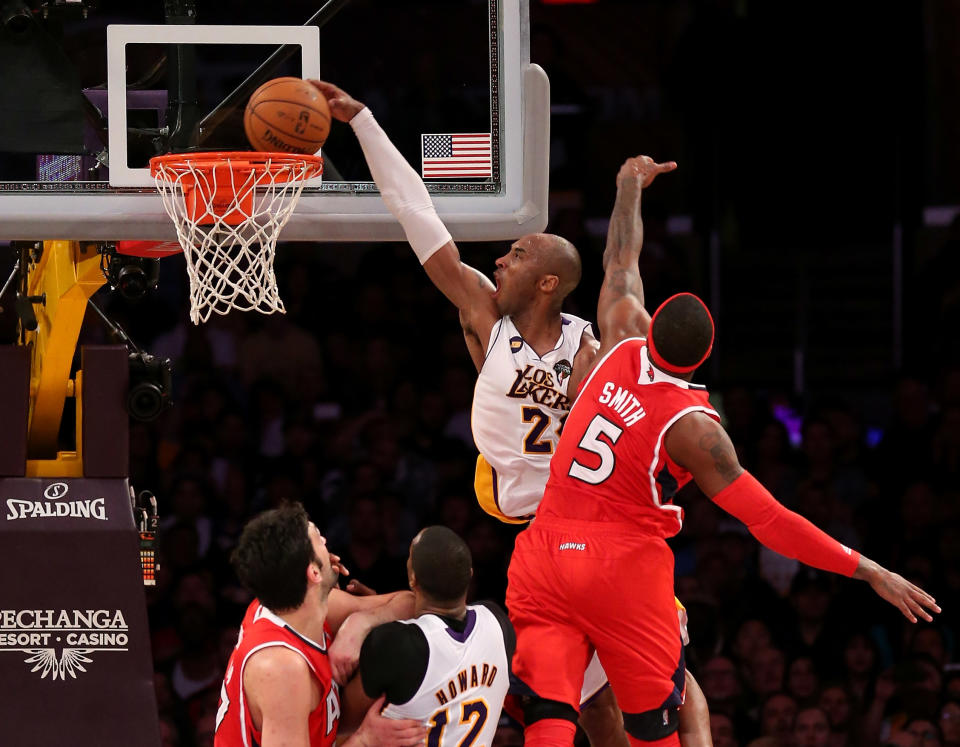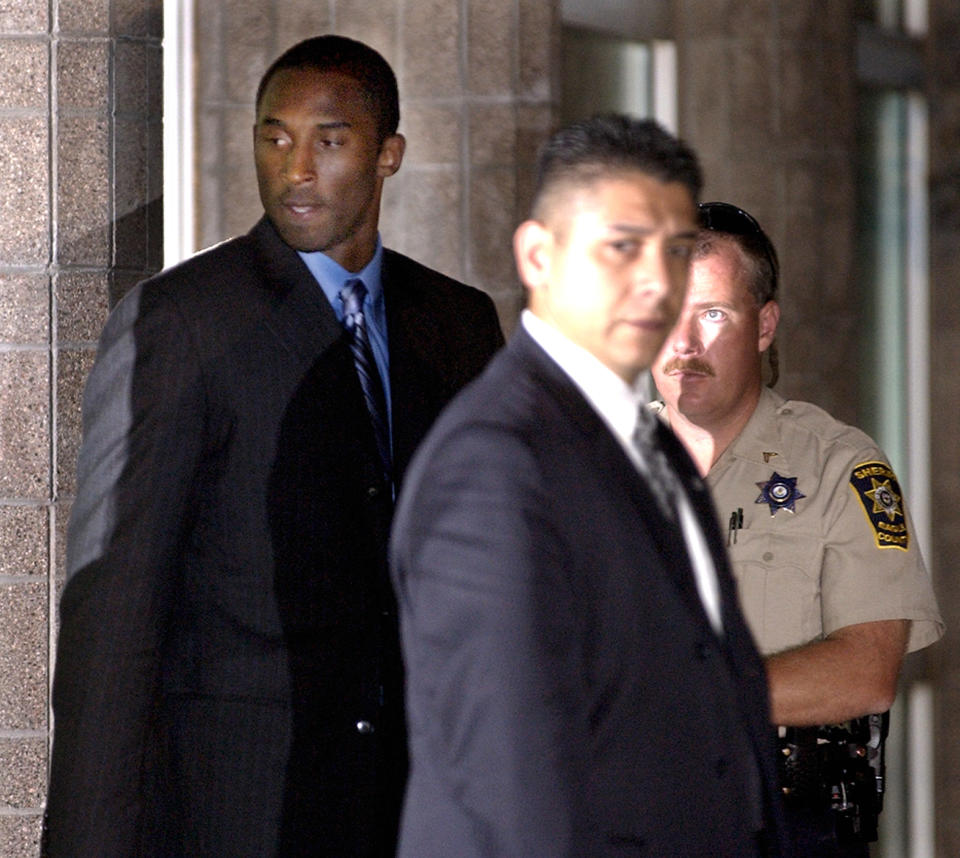Understanding the love Kobe fans have for their hero
A weekly dive into the NBA’s hottest topics.
1. Confessions of a hater
I never understood how much real estate Kobe Bryant took in my head until this week.
For as long as I’ve been a basketball fan, I’ve built up all my heroes in opposition to Bryant: the Seven Seconds or Less Phoenix Suns, the Big Three Celtics, LeBron James.
I had my reasons, of course, but in order to do that, I had to imagine him as less dynamic than he was and flatten out his edges to make him the right canvas onto which I project my takes about the selfishness of hero-ball.
Bryant’s mythology meant something profound to his fans, people who channeled Mamba Mentality to chase their dreams or to merely get through the day. I used to love looking for ways to throw a wrench into it. Look at LeBron’s stats in comparison! Six-for-24! It never worked. How could it have? Lunchtime arguments bled into a third-period class I constantly skipped to sit at the same table and relitigate the same arguments in an art class I wasn’t even enrolled in. I’m lucky art teachers don’t give a damn about anything. I’m lucky my friends never relented, because I don’t think I ever would have written about basketball if not for Kobe.

I loved basketball, but man, there was nothing I loved more than arguing, and there was no one I wanted to argue against more than Kobe. I felt like people were watching a different player. I couldn’t believe how much they loved him. They couldn’t believe how much I hated him.
In a lab experiment, he shouldn’t have destroyed the Suns or the Celtics or won five championships, three of which — I loved to point out, and man, I still can’t help myself can I? — were headlined by Shaquille O’Neal. He shot 6-of-24 and won Game 7 in the 2010 NBA Finals and took home Finals MVP? I hated grappling with the fact that Bryant’s successes defied logical outcomes. It didn’t occur to me until very recently that was precisely the point, or that five championships in, there could be a method to the madness, and that the unlikeliness of it was in fact the point.

A couple of days ago I texted one of my favorite sparring partners, and naturally we got to talking about Kobe. “I’ve always been a Kobe stan,” he said. “I’d argue for him even if I knew I was wrong.” I couldn’t help but laugh. He latched onto Kobe’s irrational self-belief. He knew it. In time, they could both drop the “irrational.” My friend went from art class to art famous pretty quickly after high school.
It was hard, but I resisted arguing back so we could really catch up and talk about, you know, our lives. But maybe they’re one in the same.
Sports give us the cover we need to tell people who we are. We draw lines in the sand and then we defend them. We say it’s because of one thing — hoops philosophy, in this case — but they’re really about deeper truths to which we cling. That’s the beautiful thing about bandwagoning in basketball. You find something that resonates and follow it to the edge of the Earth. I didn’t believe in miracles, and Kobe fans did. It infuriated me that they did, that they saw his successes as hard-earned miracles where I saw well-orchestrated dramas. But as a non-believer, how could I see anything else?
I saw the side of Kobe that went to maniacal, team-destructive heights to be great. Kobe fans saw someone who loved greatness itself, someone who was sickened by wasted potential. The truth is somewhere in the middle.
I’d like to say that I wish I could see it from their side now, but I don’t. I do wish he could still take those shots I hated and teach the next Jayson Tatum to knock on his door to do the same, and I wish I could argue about it at lunch.
2. Stop trying to fix the All-Star Game
On Thursday night, the NBA decided the best way to honor Kobe Bryant’s passing would be to confuse everyone.
At the upcoming All-Star Game, the score will reset to zero at the end of the first three quarters, with the winner of each quarter raising $100,000 for the charity of their choice. At the beginning of the fourth quarter, all those scores will get added back up, and victory will belong to whichever team is the first to get 24 (Bryant’s second jersey) points more than the leading score.
Presumably, the NBA wants to lessen the possibility of a blowout to ensure players will care for the entire game. A few things:
A: This year, they were going to try anyways.
B: The idea of one team wearing No. 8 and the other team wearing No. 24, floated by Sports Illustrated’s Chris Mannix, seems easier.
C: The NBA set it up so that the fourth quarter, traditionally the most exciting part of the game, will likely be the shortest.
D: Dude, just name a trophy after him or something.
E: Sports fans hate being confused.
Above all else, I don’t understand why the NBA is trying to fix the All-Star Game, or why it’s ever a topic of media discussion. All-Star Weekend has had better years than it did in Charlotte last year, but generally, the event has maximized its potential. Compare All-Star Weekend to its equivalents in the other big North American leagues: It’s not a joke, people actually know about it, and some of them watch it. For a no-stakes advertisement for the NBA, that’s not bad.

3. Why it’s important that we remember the sexual assault case against Kobe Bryant
In 2003, Kobe Bryant checked into a hotel in Edwards, Colorado, and was accused of sexually assaulting a 19-year-old employee. The question of how to approach the details of the case, which was eventually settled in civil court, has been discussed again and again since Bryant’s death on Sunday morning, turning the internet into a battleground for the narrative that will define Bryant’s legacy.
Some of the fans he inspired want to mourn Bryant as the man they saw him as when he was alive. But survivors of sexual assault and their advocates don’t want the case or its long-lasting ramifications to be forgotten. The discussion of Bryant’s rape accusation might feel “too soon” to some, but the biggest moments are the ones that set the public record. The time has to be now, because whitewashing has real stakes.
According to the New York Daily News, “the number of forcible rapes reported dropped 10 percent in 2003 from the previous year,” in Eagle County, Colorado. Victims told advocates, “it was because they were afraid they're going to be treated like the victim in Kobe Bryant’s [case.]” Bryant’s accuser’s mental health was called into question, she was slandered in the media, doxxed and slut-shamed before we even knew what those terms were. After the criminal case was dismissed, Bryant apologized as a condition of the dismissal. “After months of reviewing discovery, listening to her attorney, and even her testimony in person, I now understand how she feels that she did not consent to this encounter.”
Sexual assault survivors watched the case closely then, and they are watching its handling now. Survivors aren’t looking for clout. They aren’t looking to tarnish a legacy for the sake of tarnishing a legacy. They are looking for an affirmation that what happened to them matters, that it deserves to be heard and that they deserve justice.
There is a great deal of suffering going around, and the stories we tell ourselves to cope are converging in uncomfortable ways. Compassion often requires coming to terms with discomfort. It requires making room for the truth, even though a story feels easier.
More from Yahoo Sports
